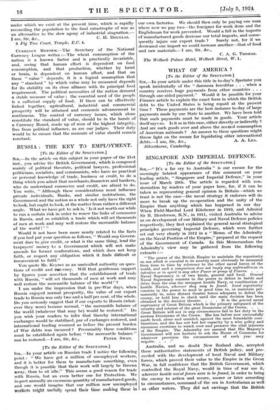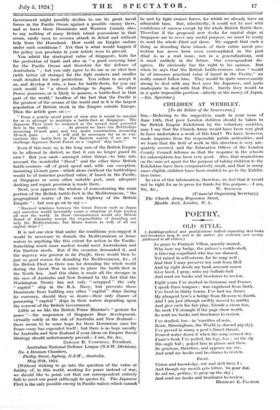SINGAPORE AND IMPERIAL DEFENCE. [To the Editor of the SPECTATOR.]
Sm,—" It's a far cry to Australia " is our excuse for the seemingly belated appearance of this comment on your leading article, " Singapore and Imperial Defence," in your issue of March 29th. The article is regarded with con.
sternation by readers of your paper here, for, if it can be taken as representing general opinion in Britain=which we trust is not the case—the naval strategy it endorses will do more to break up the co-operation and the unity of the Empire than anything which has happened in our day When Field-Marshal Lord Kitchener in 1910, and Admiral. Sir R. Henderson, R.N., in 1911, visited Australia to advise us on development of our Military and Naval Defence policies respectively, they first explained the general naval strategical principles governing Imperial Defence, which were further set out very clearly in 1912 in a " Memo. of the Admiralty on the Naval Position of the Empire," prepared at the request of the Government of- Canada. In this Memorandum the Admiralty's view may be gathered from the following extracts :—
" The power of the British Empire to maintain the superiority on sea which is essential to its security must obviously be measured from time to time by reference to the other naval forces of the world, and such a comparison does not imply any unfriendliness in intention or in spirit to any other Power or group of Powers. . . . Naval Supremacy is of two kinds, general and local. General Naval Supremacy consists in the power to defeat in battle and drive from the seas the strongest hostile Navy, or combination of hostile Navies, wherever they may be found. Local superiority consists in the power to send in good time to, or maintain per- manently in, some distant theatre forces adequate to defeat the enemy, or hold him in check until the main decision has been obtained in the decisive theatre. . . . It is the general naval supremacy of Great Britain which is the primary safeguard of the security and interest of the great Dominions of the Crown. . . . Great Britain will not in any circumstances fail in her duty to the oversew Dominions of the Crown. She has before now successfully made head, alone and unaided, against the most formidable com- binations, and she has not lost her capacity by a wise policy and strenuous exertions to watch over and preserve the vital interests of the Empire. The Admiralty are assured that His Majesty's Government will not hesitate to ask the House of Commons for whatever 'provision the circumstances of each year may
require. . ."
Australia, and no doubt New Zealand also, accepted- these authoritative statements of British policy, and pro- ceeded with the development of local Naval and Military forces, which proved their value to the Empire in the Great War, in full confidence that the British Government, which
controlled the Royal Navy, would in time of war use it, wherever hostile naval forces were to be found, in order to bring the enemy to action and secure, sooner or later according to circumstances, command of the sea in Australasian as well= as other waters. They did not envisage that the British
Government might possibly -decline to . use its great naval. forces in the Pacific Ocean against a possible enemy there, and so leave these Dominions and Western Canada also, to say nothing of many British island possessions in that ocean, easily open to oversee attack in detail and without help from the Homeland. How could an Empire endure under such conditions 'V Yet that is what would happen if the policy you proclaim in your article were to prevail.
You admit the strategical value of Singapore, both for the protection of trade and also as " a good covering base for the Pacific Ocean and therefore for the defence of Australasia " ; but you only agree to its use as an ideal base (with better oil storage) for the light cruisers and smaller craft detailed for trade protection. You refuse to accept it as, and develop it into, a base for battle-fleets, for you say such would be " a direct challenge to Japan. No other Power possesses, or is likely to possess, a battle-fleet in that part of the world," heedless of the fact that the Pacific is the greatest of the oceans of the world and in it is the largest population of British stock in the Empire outside Europe. Then the article goes on :—
" From a purely naval point of view also it would be suicidal for us to attempt to maintain a battle-fleet at Singapore. The Japanese Fleet must be reckoned as the second most powerful fleet in the world. . . . At present we have ten Battleships mounting 15-inch guns and two under construction mounting 16-inch guns . . . it will still be necessary for us to con- centrate this battle-fleet in Far Eastern waters if we are to challenge Japanese Naval Power on a ' capital ' ship basis."
Even if this were so, is the long arm of the British Empire to be allowed to shrivel, so that it can no longer guard its own ? But you omit—amongst other things—to take into account the wonderful "Hood" and the other three British battle-cruisers—all of great speed and, with one exception, mounting 15-inch guns—which alone (without the battleships) would be of immense practical value, if based in the Pacific, at Singapore or some other suitable port, once adequate docking and repair provision is made there.
Next, you approve the wisdom of concentrating the main portion of the British battle-fleet in the Mediterranean, " the geographical centre of the main highway of the British Empire " ; but you go on to say :—
" strained relations between the Great Powers such as Japan and ourselves would inevitably cause a situation of high tension all over the world. In those circumstances would any British Board of Admiralty accept the responsibility of denuding not only the Mediterranean, but Home waters as well, of all our capital ships ? "
It is not our view that under the conditions you suggest it would be necessary to denude the Mediterranean or home waters to anything like this extent for action in the Pacific.
Something much more modest would meet Australasian and Far Eastern needs. But if the occasion demanded it, and the urgency was greatest in the Pacific, there would then be just as good reason for denuding the Mediterranean, &c., of the British Fleet as there was for denuding the whole world during the Great War in order to place the battle-fleet in the North Sea. And this claim is made all the stronger in the case of Australia and New Zealand by the fact that the Washington Treaty has not only " scrapped " the only " capital " ship in the R.A. Navy, but prevents these Dominions from building any other " capital " ships during its currency, should they so desire—their only chance of possessing " capital " ships in their waters depending upon the consent of the British Government.
Little as we like the British Prime Minister's " gesture for peace "—the suspension of Singapore Base development, virtually solely at the risk of Australia and New Zealand— there seems to be some hope for these Dominions once his Peace essay has expended itself ; but there is no hope navally for Australia and New Zealand if your ideas on Empire Naval Strategy should unfortunately prevail.—I am, Sir, &c., GERALD R. CAMPBELL, President, Australian National Defence League (N.S.W. Division).
No. 4 Denman Chambers, Phillip Street, Sydney, N.S.W., Australia.
May 27th, 1924.
[Without wishing to go into the question of the value or
futility of, in this world, working for peace instead of war, we should' like to point out that our correspondent entirely fails to meet our point (although he quotes it). The Japanese Fleet is thepnly possible enemy in Pacific waters which cannot
-be met• by light -cruiser forces, for- which we already have an admirable base. But, admittedly, it could not be met with confidence of success except by the whole British Battle-fleet. Therefore if the proposed new docks for capital ships at Singapore are to serve any useful purpose, we must be ready to send the whole Fleet out there. We suggest that such a thing as denuding these islands of their entire naval pro- tection has never been even contemplated in the past (that is, as a real issue, not in a generalization), and is most unlikely in the future. Our correspondent dis- agrees. He obviously has the right to his opinion. But when he says that the British battle-cruisers alone " would be of immense practical value if based in the Pacific," we really cannot follow him. They would be quite unnecessarily strong to deal with any fleet save the Japanese, and quite inadequate to deal with that Fleet. Surely they would be in a quite impossible position—utterly at the mercy of Japan. —ED. Spectator.]



















































 Previous page
Previous page